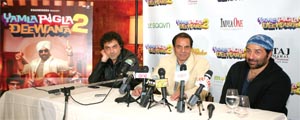
NEW YORK (TIP): Dr. Bhim Rao Ambedkar was inspired to devote his life in service to emancipation for the Untouchables of India after discovering black liberation struggles in the USA, say organizers of a centenary conference at Columbia University. The conference, “Ambedkar’s Century: 100 Years From the USA”, occurs on June 29, exactly 100 years to the day since Bhim Rao Ambedkar arrived in New York City in 1913 to begin studies at Columbia University.
While in the USA, he encountered American civil rights movements and saw strong parallels between the plights of blacks and Untouchables. Mohan Ram Paul, a conference panelist and the protégé of civil rights leader Kanshi Ram, said, “Generations of oppression by Brahminism has divided the Mulnivasi people into 6,000 subcastes which are disunited. Our conference in New York City will unite people from many castes, many religions, and many nations in an alliance for the liberty of all.”
Dr. Amrik Singh, centennial conference coordinator and a South Asian public affairs expert, remarked, “Before Dr. Ambedkarji returned to India to demand liberation of the oppressed people of South Asia, he was first molded by American freedom movements while gaining an education at Columbia University. In the USA, he saw blacks enduring the same mental and physical tortures inflicted upon Untouchables for no cause save heredity.”
“The USA has its first black president and, although troubles still abound, the liberties of African Americans are no longer in much greater danger than those of any other American citizen,” said Bhajan Singh Bhinder, a director of Bhim Rao Ambedkar Sikh Foundation, the group organizing the conference. “Slavery is history, racism is dissipating, but caste survives. Changed laws have not changed hearts and minds in India, where a Dalit is the victim of a hate crime every 18 minutes. This conference is a spark for the modern civil rights movement as we examine how Dr. Ambedkarji’s legacy agitates us to action.”
The conference begins with a Recognition Ceremony at 12pm on Saturday, June 29 outside Lerner Hall on the Columbia University campus. General session will occur in Lerner Hall from 1pm to 6pm. Six students of Dr. Ambedkar’s life will spend those hours delving into his legacy to explain his devotion to the principles of liberty, equality, and fraternity.
Six topics to be addressed are:
1. “Betrayal of Dr. Ambedkar, the Indian Constitution, and the Hindu Code Bill” by Mohan Ram Paul of Bhim Rao Ambedkar Sikh Foundation;
2. “Dr. B. R. Ambedkar’s Critique of Hindu Scriptures and The Model for Reconstruction of the Society” by Dr. Manisha Bangar of Backward and Minority Community Employees’ Federation;
3. “Anti-Moolnivasi Attempts to Reconcile Ambedkar and Gandhi” by Pieter Singh of Sikh Information Centre;
4. “Babasaheb Ambedkar, Poona Pact, and the Cultural Politics of Brahminism” by Dr. P. D. Satyapal of Andhra University;
5. “Subaltern Counter-Memory” by Dr. Angana Chatterji of UC Berkeley;
6. “The Importance of Dr. B. R. Ambedkar’s Life and Mission,, Guru Nanak Khalsa College, and Hindu Mahasabha” by Dr. Amrik Singh of California State University, Sacramento. Avtar Singh Adampuri, also a director of BRASF, stated: “This conference is a cause for celebration, but it is also an offensive against the root cause of the suffering of South Asia’s downtrodden people, which is the Brahmanical ordering of society.
We hope every person who believes in ending oppression will accept our hospitality to attend this conference and be inspired by the example of Dr. Ambedkar.”





Be the first to comment